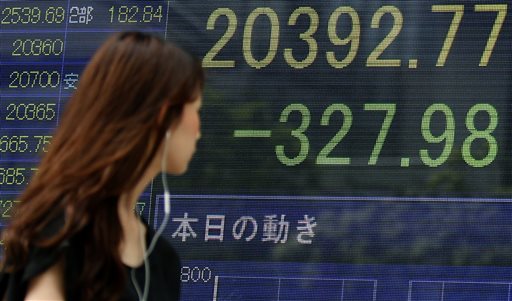Asian shares fall as China weakens currency further

A woman walks past an electronic stock indicator of a securities firm in Tokyo, displaying Tokyo’s Nikkei 225 that lost 327.98 points, or 1.58 percent, to 20,392.77, Wednesday, Aug. 12, 2015. Asian stocks sank as China let its currency fall for a second day following a surprise devaluation that rattled global financial markets. AP PHOTO/KEN ARAGAKI
HONG KONG–Asian shares tumbled on Wednesday as investors fretted over the impact that a second cut in China’s currency in as many days will have on economies closely tied to the Asian giant.
The dollar declined slightly in Tokyo trade, after rising on news the People’s Bank of China (PBoC) had again reduced the value of the yuan against the greenback.
Hong Kong lost 2.38 percent, or 582.19 points, to end at 23,916.02, while Shanghai dropped 1.06 percent, or 41.59 points, to 3,886.32 while the Shenzhen Composite Index, which tracks stocks on China’s second exchange, fell 1.54 percent, or 35.09 points, to 2,249.18.
Other regional markets also lost ground, with Tokyo closing down 1.58 percent, or 327.98 points, at 20,392.77, while Sydney ended 1.66 percent lower at 5,382.10. Seoul ended 0.56 percent, or 11.8 points, lower at 1,975.47.
Beijing’s surprise devaluation of the yuan on Tuesday sent ripples through global financial markets and prompted a rout on Asia-Pacific currencies over concerns it could hurt other economies in the region.
The second yuan cut on Wednesday brings the reductions this week to 3.5 percent–the largest in more than two decades–in a move widely seen as designed to boost China’s flagging economy.
Concerns about China’s stalling growth were compounded on Wednesday when three key indicators–industrial production, retail sales and fixed asset investment–all came in below market expectations.
“Today’s weak fixing indicates the PBOC wants to see further depreciation in the yuan, as yesterday’s drop won’t be enough to prop up China’s exports,” Kenix Lai, a foreign-exchange analyst at Bank of East Asia in Hong Kong, told Bloomberg News.
“Capital will flee from China to the US due to the economic slowdown and the yuan devaluation.”
China-focused stocks fall
Wall Street tumbled Tuesday on the initial devaluation, with the Dow Jones Industrial Average, S&P 500 and Nasdaq Composite Index all closing down around one percent or more.
In Tokyo share trading Wednesday, automaker Toyota fell 1.66 percent to 7,987 yen, while Nissan, also dependent on China for sales, dropped 2.09 percent to 1,168.5 yen.
Airlines lost ground in Shanghai on worries that a weaker yuan will raise the cost of servicing US dollar-debt. Air China fell 5.04 percent to 10.92 yuan and Hainan Airlines dipped 3.28 percent to 5.30 yuan.
In Hong Kong, development stocks also took a hit from debt concerns, with China Resources Land dropping 7.92 percent to HK$19.80 and China Overseas Land & Investment giving up 8.51 percent to HK$23.10.
Commodities also lost ground on concerns that demand is set to fall in Asia’s biggest economy–a major importer of energy, metals and grains–with oil sinking to a six-year low.
Oil prices came under further pressure from news the OPEC producer cartel raised output in June, adding to a global supply glut.
US benchmark West Texas Intermediate for delivery in September fell to $42.99 a barrel on Wednesday, after hitting $43.08 in New York–the lowest level since March 2009.
European benchmark September Brent crude for September slipped 26 cents to $48.92 in afternoon trade.
Safe-haven gold fetched $1,117.50 compared to $1,110.35 late Tuesday.
In Tokyo forex trade, the dollar was worth 124.53 yen Wednesday afternoon, down from 125.12 yen in New York late Tuesday.
The euro, meanwhile, strengthened to $1.1131 and 138.61 yen compared with $1.1042 and 138.15 yen in US trade, after Greece’s government agreed the text for an 85-billion-euro ($94-billion) international bailout.
In individual results, Commonwealth Bank of Australia said full-year net profit rose 5 percent to a record Aus$9.063 billion (US$6.62 billion). Shares halted trading ahead of an Aus$5-billion capital-raising.
The Hong Kong stock exchange said its first-half earnings surged 73 percent to a record high as it reaped the benefits of a link-up with the Shanghai bourse.
In other markets:
— Mumbai fell 1.27 percent, or 353.83 points, to close at 27,512.26.
Infosys rose 3.39 percent to 1141.75 rupees but Vedanta plummeted 8.03 percent to 113.90 rupees.
— Singapore closed down 2.90 percent, or 91.57 points, to 3,061.49.
Agribusiness company Wilmar International eased 1.30 percent to Sg$3.03 while real estate developer Capitaland fell 4.69 percent to Sg$3.05.
— Kuala Lumpur fell 1.64 percent, or 26.78 points, to close on 1,609.93.
Sime Darby fell 1.47 percent to 8.04 ringgit, Malaysian Banking fell 1.29 percent to 8.41 ringgit, and Petronas Gas lost 0.46 percent, ending at 21.48 ringgit.
— Jakarta ended down 3.10 percent, or 143.10 points, at 4,479.49.
Bank Mega gained 7.41 percent to 2,900 rupiah while textile and garment company Sri Rejeki Isman fell 13.43 percent to 303 rupiah.
— Wellington fell 1.12 percent, or 65.14 points, to 5,757.21.
Spark New Zealand was 2.46 percent off at NZ$2.77 while Fletcher Building closed 2.05 percent down at NZ$7.64
— Taipei fell 1.32 percent, or 110.76 points, to 8,283.38.
Taiwan Semiconductor Manufacturing Co. dropped 1.53 percent to Tw$128.50 while Hon Hai Precision Industry lost 2.26 percent to Tw$86.50.
— Manila lost 0.99 percent, or 75.02 points, to 7,495.43.
Top-traded Semirara Mining and Power rose 1.96 percent to 130 pesos, but BDO Unibank lost 1.92 percent to 102 pesos and Manila Electric fell 2.09 percent to 300 pesos.
Bangkok was closed for a public holiday.
Originally published on Aug. 12, 2015, at 11:26 a.m.














